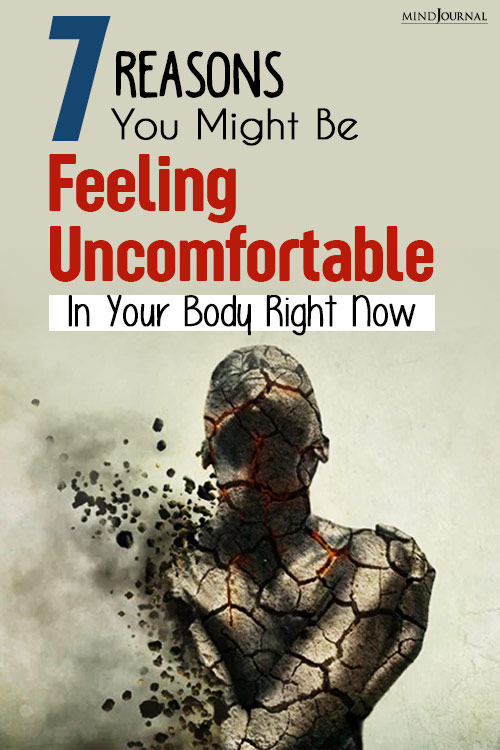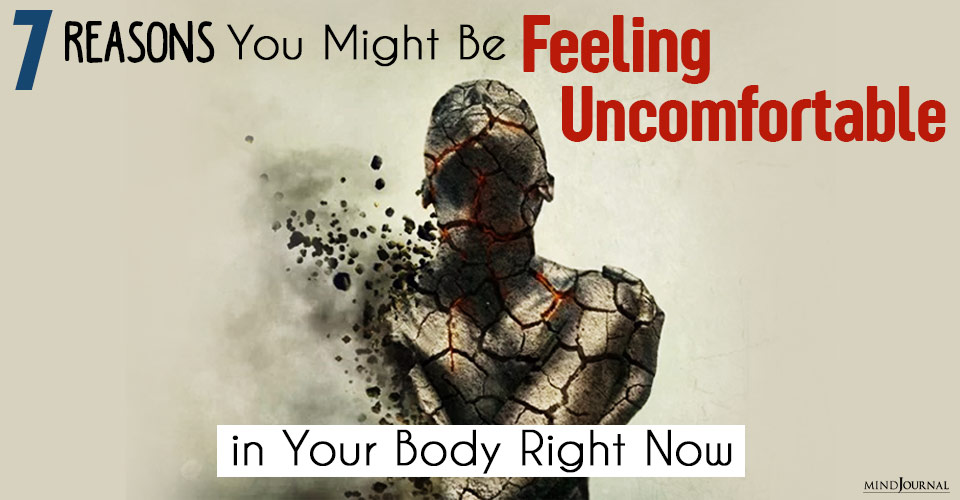Are you feeling uncomfortable in your body right now? Don’t know what to do and how to feel comfortable? Knowing the reasons for your discomfort may help you solve the problem.
I’ve been thinking a lot lately about the idea of “feeling uncomfortable” in our bodies.
It comes up with clients all the time, as well as in the real world, where people claim that they want to lose weight or change something about the shape/size of their body in order to “feel more comfortable.”
Lately, it’s been a common refrain among my clients as they reckon with the weight gain that happened during quarantine: I just feel uncomfortable in my body right now.
I’m always super curious about this language and ask my clients to break it down for me. What exactly does “uncomfortable” mean, and what is it really about?
Occasionally I’ll get an answer about weight gain leading to joint pain, sleep apnea, loss of strength, or the feeling of huffing and puffing up a flight of stairs.
While I acknowledge that such physical discomforts are real and valid, I also generally encourage clients to separate the discomfort of being out of shape from the discomfort of gaining weight. Feeling un-fit can happen (and suck) at any weight, and getting fitter can improve a lot of that discomfort even if you don’t lose weight.
Plus, far more often when I ask my clients about what the discomfort is about, I get vague answers like:
“I’m just not comfortable/don’t feel good at this weight.”
“I know my weight doesn’t define me, but I prefer the way I feel when I’m thinner.”
“I don’t like the way my clothes fit.”
“I just want to feel good.”
In such moments, I encourage my clients to stop and acknowledge that feeling good/comfortable isn’t as simple as we want it to be.
After all, humans are extremely complex, and no matter how much we want it to be objective, what feels good or bad to us is based entirely on context. As an example, think about how your partner tickling you in bed might feel delicious, but a stranger on the street tickling you would more likely feel gross and scary.
Context also matters when it comes to feeling good or bad, comfortable or uncomfortable, in your body. As an example, being naked at home alone in your bed might feel totally comfortable, but being naked on the subway or at work would be extremely (and catastrophically) uncomfortable.
Can you see how “feeling comfortable in your body” is completely contextual?
Having a big ass might feel sexy when you’re with a partner who you know loves big asses, but it might feel totally embarrassing with a different partner who is historically into skinny, boy-ish bodies.
And the new weight you gained might feel comfortable and fine around your partner or friends but feel extremely bad/uncomfortable around your mother who has a habit of commenting on and criticizing your body/weight.
Related: 21 Things That Change When You Start Respecting Yourself
Context matters when it comes to how you feel in your body, and saying you “just feel uncomfortable at this weight” or “just want to feel better” in your body often speaks to a complete misunderstanding (or oversimplification) of the deeply complex, nuanced experience we have of living inside our bodies.
So what can we do instead?
Most of my clients experiencing this discomfort report it feeling like an overwhelming, non-specific full-body cloud of badness and grossness.
What I help them do is get super specific about what’s going on, get clear on all the various contexts at play, and pull apart the separate threads of discomfort, so that we can deal with them each separately and directly.
While there are limitless possibilities for the contexts and threads at play when you “feel uncomfortable” in your body, I wanted to address the seven most common ones I’ve been seeing come up with clients tackling post-quarantine body changes or weight gain, and how to deal with them.
7 Reasons You Might Be “Feeling Uncomfortable in Your Body” Right Now
1. Physical discomfort due to too-tight clothing.
You feel physically uncomfortable in clothing that no longer fits you. Super-tight clothing restricts movement and breathing, cuts off circulation, and digs into our flesh.
Solution:
Put the too-tight clothes away out of sight, or get rid of them altogether. Buy and wear clothes that fit comfortably.
2. You’re triggered into fight/flight/freeze/fawn.
Due to your unique social conditioning and life experiences, the changes your body has gone through (weight gain, shape change, etc) are triggering an internal alarm system, putting you in survival mode. You’re in a neurologically dysregulated state.
For me, this state usually feels like a panicked internal monologue of “DANGER, DANGER, DANGER!!!!!!” It’s very hard to feel comfortable when your survival alarm bells are ringing, and something inside you is screaming that you are not safe.
Solution:
Recognize that your survival alarm bells are ringing and that the discomfort you’re feeling is your biology just trying to protect you. Then find ways to calm down and regulate your nervous system, to return to a feeling of safety and groundedness.
This can be done with another person who helps regulate you via touch (hugs, cuddles, sex) or emotional support (listening, acknowledging, validating, therapy), or by yourself using movement (challenging balance and fine motor skills, burning off excess energy) or other tactics (meditation, flow state activities, journaling, resting, napping, masturbating, etc).
Note: IMO, everyone should build up a diverse set of skills and tools for re-regulating your nervous system when your alarm bells get triggered, especially if you struggle with body image issues. This takes time, education, patience, and practice, but it’s sooo worth it so that you know exactly how to handle it to “come back to yourself” when you get triggered!
Related: 9 Tips for Cultivating Body Positive Fitness
3. You don’t recognize yourself.
You’re feeling the discomfort of newness and foreignness in your own body. It can be weird and uncomfortable to get used to anything new, whether that something is new shoes, a new apartment, or a new town, but it’s especially confusing and alarming when it’s your own body.
It’s normal to experience discomfort when your body changes, and you haven’t had the time to get to know and connect with your new body.
Solution:
Get to know your new body. Spend time gazing at it, tuning into the sensations of living in it, touching it, feeling it, and exploring it from a place of kindness and curiosity (instead of judgment). Seek to know and understand this new body you live in!
4. You’re fighting against negative somatic coding.
Due to the way we’re wired, we learn to associate specific physical sensations with specific meanings, a sort of shortcut key for living life that gets coded deep in our unconscious in its most basic form: safe/unsafe or good/bad.
As an example, if you cut bangs as a kid and everyone made fun of you for it because it looked terrible, you would likely have coded the physical sensation of having bangs on your forehead as bad, and feel self-conscious and uncomfortable whenever you feel hair falling across your face.
However, if you cut bangs as a kid and everyone went gaga for how cute you were, you would likely have coded the physical sensation of having bangs on your forehead as good, and feel confident and pretty whenever you feel hair fall across your face.
The same is true of different physical sensations associated with body shape and size. For example, you might have learned that the feeling of too-tight clothing is Very Bad, and now whenever you feel your pants a bit tight you feel shame and guilt.
Or maybe you learned that the feeling of a flat stomach in the morning is Very Good, and now whenever you wake up with flat abs, you feel successful, proud, confident, and worthy.
Solution:
Identify the exact specific physical sensation(s) you’re responding to when you feel good/bad or comfortable/uncomfortable in your body, and if possible, where the somatic coding of it came from.
Then get curious about the beliefs or associations it’s connected with, and explore both the somatic sensation(s) and the beliefs/associations until what you need to heal comes into clarity, emotional energy is released, and/or the feeling becomes more tolerable.
Related: Grief Work & Body Image: How Grief Helps In Your Journey of Body Neutrality
5. You’re dealing with death work.
Breaking old patterns, or breaking the “rules” you learned to follow can feel like dying, especially the first time you do it. For example, the first time I ever went braless in public I had fifteen years of negative somatic coding (aka fear, shame, and tons of alarm systems screaming “DANGER!”) attached to the sensations of being braless in public.
I walked around that day in an absolute panic, desperately wanting to run away, disappear, or be swallowed up by the earth.
I felt like I was dying, or wanted to die, or that the whole world might suddenly explode because I had broken this one important rule. It was a level of discomfort I could never explain to someone who didn’t have my specific history of boobs, beliefs, fear, shame, and trauma. Going out braless got easier with each time I practiced, however, and now going braless in public is no big deal at all.
Solution:
Learn to recognize when you’re dealing with death work; notice when your discomfort comes in the form of heart racing, sweaty palms, tunnel vision, lightheadedness, a major rush of adrenaline, hyperfocus, and a feeling of pending doom, a feeling like you might die, or a feeling of wanting to die or disappear.
Validate for yourself that this is normal and doesn’t make you crazy or weird, but that it’s just a natural side effect of breaking an old deep pattern or “rule” tied somehow to your survival.
Identify the pattern or rule you’re breaking (for example: wearing shorts or a bikini, being fat in public, eating carbs, being bigger than your partner, etc.), and practice facing your fear of breaking your pattern/rule over and over again using baby steps until it no longer has this power over you.
Related: How To Help A Partner Struggling With Body Issues and Insecurities
6. You’re conflating shame and discomfort.
Shame and discomfort are not the same things, and learning to parse them apart will allow you to practice tolerating discomfort without it automatically triggering shame. Once you learn to identify discomfort coming from clothes that are too tight, the newness of your own body, negative somatic coding, or death work, the next step is to separate that discomfort from shame.
For example, if you’re gassy and bloated after a big meal, you might be a bit physically uncomfortable. But if you also believe flat abs are important to your worth and being bloated makes you a disgusting failure as a person, then you’re not just going to feel uncomfortable physically, you’re also going to feel the discomfort of shame.
Solution:
Do the best you can to identify and name the specific threads of discomfort coming up for you, and separate them mentally from shame. Remember that shame and discomfort don’t need to co-exist and that the discomfort is often real and valid, while the shame is not.
Then explore the shame with curiosity if you can, to name exactly where it comes from, what it’s saying to you, where you learned it, who benefits from it, and how it might be attempting to serve or protect you. Let yourself be uncomfortable while also letting go of the shame (aka the meaning, beliefs, stories, and associations) associated with it.
7. You’re struggling to tolerate discomfort.
There’s so much about having a body that can be uncomfortable– give yourself permission to be present with and feel all of that discomfort without there being something wrong. Physical pain is uncomfortable. Emotional pain is uncomfortable. Sadness, vulnerability, and trying new things can be uncomfortable. So can cognitive dissonance, and hormone fluctuations, and bodily functions.
Discomfort is not necessarily a sign that anything is wrong, however, and learning to get comfortable with discomfort instead of rejecting it will make you far more resilient when it comes to body image– as well as so many other areas of life and mental health!

Solution:
Identify your specific sources of discomfort and then learn to tolerate (and even welcome!) them, instead of trying to reject them, push them away, fix them, or avoid them. Notice and feel the discomfort, but don’t allow yourself to attach a story about what the discomfort means, or try to fix it.
Super curious what you think and if this was helpful. Which of these seven have you experienced?
Written by: Jessi Kneeland
Originally appeared on: Jessikneeland.com
Republished with permission.










Leave a Reply
You must be logged in to post a comment.